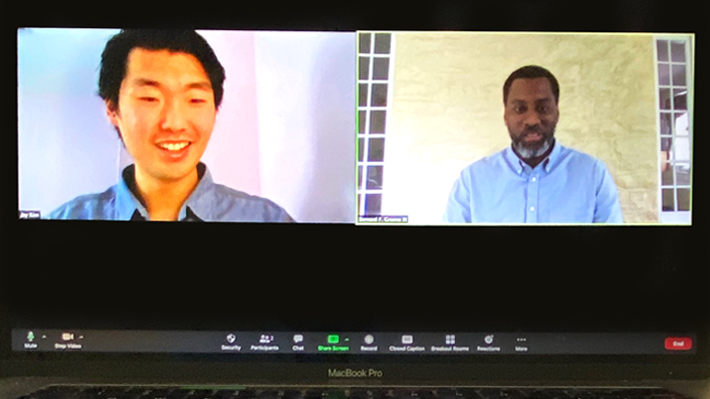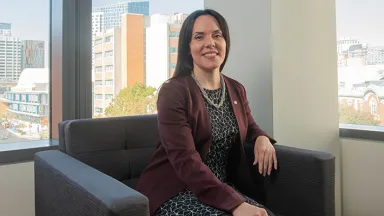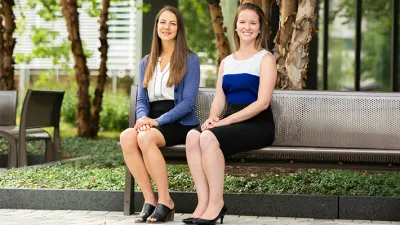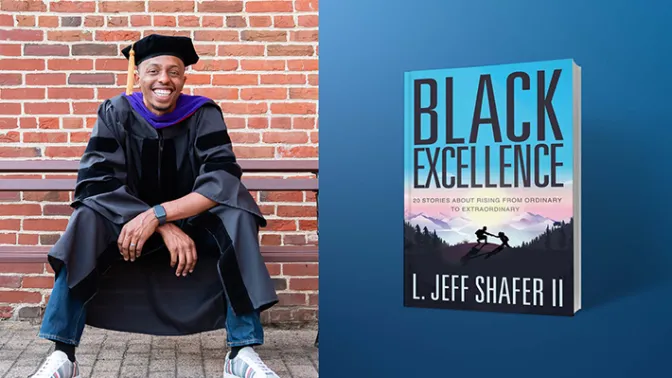
Mentor-In-Residence Q&A: Takeaways from Graduate Students and Industry Mentors
As routines were disrupted this spring, students in LeBow’s MBA and MS programs relied on a consistent source of advice and guidance: Drexel LeBow’s Mentor-in-Residence (MIR) program.
Coordinated by Kelly Deily, associate director of MBA/MS Career Services, the MIR program draws upon the expertise of over 80 business leaders, more than half of them LeBow alumni. Full-time MBA and MS students in good academic standing are eligible to complete orientation for the program each January, after which they can select a mentor whose field and experience most closely matches their own career goals and meet with them for an hour-long private session.
Since its relaunch in 2018, the MIR program has proven to be a popular program, with students signing up quickly as soon as openings are announced. After transitioning to remote weekly sessions this spring, Deily was able to expand the number of mentorship opportunities available, including offering sessions during the summer term for the first time.
We invited alumni and current students to share what they’ve learned in the program — through in-person and the more recent remote sessions — and the meaningful connections that have emerged.
Why did you choose to participate in the Mentor in Residence program?
M. Ghayeb, MS marketing ‘21: My past experience with mentors was great, especially during undergrad. As an international student, I feel it’s very important for me to tap into local knowledge. I thought having someone to talk to me about their own experience would be more beneficial than just reading articles online and would open doors for me.
Zenobia Dante, MS business analytics ’21: I thought it would be a wonderful opportunity to seek career advice from experienced professionals in different industries. Being an international student, I was fairly new to the networking world, and I felt the MIR program was just the right platform to teach me to build and maintain “professional friendships.” It can be intimidating to approach someone and ask about their career, and the MIR program takes that first step for us.
Jea Kim, MS business analytics ‘21: Before pursuing my master’s degree in business analytics, I completed an undergraduate degree in natural science. In order to make a pivot into this new field of study, I realized that I needed to educate myself. I planned to network and speak with as many people in data-related business roles as I could to get a better idea of the career path I should pursue, and the mentor I identified had professional experience that I really aspired to follow.
What were your key takeaways?
MG: These meetings really reassured me that I’m on the right track. I learned that the cycles of ambiguity that young professionals like myself go through are completely normal. We always have to work with incomplete information, no matter how experienced we are, so we have to be extremely cautious when making decisions, especially about employment.
ZD: I have started to do more networking, and I attended a Data Science Q&A webinar that I learned about through networking on LinkedIn; I even submitted questions to the person conducting the webinar in advance and ended up writing a post about the experience that got almost 4,000 views! Participating in MIR was the nudge I needed to help me start networking and building relationships.
JK: The session really helped by informing me of networking methods that I hadn’t previously known about. Before the pandemic, my mentor gave me a list of conventions to join and network in, while also walking me through the tasks that were most effective for him when he was in my position. Although many of the conventions have unfortunately been canceled due to COVID-19, I have begun to effectively network using LinkedIn and other professional platforms.
What inspired you to become a mentor?
Jeffrey Berg, MBA ‘01, VP, North America, DLL: My parents went to Drexel and met here, and since I came for my MBA, I’ve stayed involved as a judge for the Baiada Institute’s business plan competition. There’s a strong mentoring network at my company, but I also find it helpful to get a glimpse at things outside my company and what the future holds. The Mentor-in-Residence program offered that.
Koba Khitalishvili, BS ’14, MS ’16, Data Scientist, Jornaya: I wanted to help people in the position I was in a couple of years ago, so they can figure out how they want to build their career. Plus, I have two younger brothers, so giving advice always came naturally to me.
Sandra Yang, MBA ‘13, US Omnichannel Strategy Director, AstraZeneca: I really appreciate how supportive Drexel has been for working professionals, so I feel that kinship with Drexel and with my MBA cohort. Mentoring has been helpful in my career growth, and I want to be able to give back to others because I’ve been blessed to have great mentors on my path.
How did your sessions go? What did students want to know?
JB: Each one of the students I met with had a different dilemma, and I enjoyed helping them with that. I helped one student figure out how to tell his story. In his mind, it was all negative: He’d been with a startup in California, where he had helped them do their revenue models and accounting streams, and the company went dark on him. He didn’t know how to position that as a strength. I told him, think about Batman, Spiderman, pretty much any superhero – they all have a low point that was their origin story, and now you have yours!
KK: At my sessions in fall 2019, the students wanted to know: How do you present your best self? What kind of problems do you work on? They all asked about the environment and the industry I was working in and whether they would like it.
SY: The students I met with had great depth of experience, both in the classroom and outside, so a theme in our conversations was, “How can I leverage this degree and my past experience to take the next step in my career?” Because I have a background in marketing, we talked a lot about storytelling: how to frame their story and how to manage their personal brand. Often, they had questions about how they can join my organization, or ones like mine, so we talked about the hiring process and any guidance I had on securing an opportunity.
What were your takeaways as a mentor?
JB: I really liked hearing the students’ ideas and creativity, and I came away inspired that, one day, the people of this generation will replace me. Many leaders struggle with the idea that they’ll be replaced. I think it’s awesome, and I get a lot out of doing anything I can to fuel the growth of the next generation.
KK: I didn’t realize how much I was going to enjoy it. You can see in the students’ faces that you’re really helping them and giving them information that’s going to be valuable in their careers for years to come. I felt I was doing something meaningful, and I want to do it again.
SY: It’s refreshing and encouraging to be a mentor because I find I also learn new things, and it’s exciting to feel that I’m a part of someone’s journey and growth. I felt so privileged that these students were willing to share and be open about their aspirations. Seeing the world through someone else’s eyes gives you a whole new world of perspective.
If you’re a LeBow alum interested in volunteering with the Mentor-in-Residence program, or a full-time MBA or MS student interested in being paired with a mentor, contact Kelly Deily, associate director of MBA/MS Career Services.


